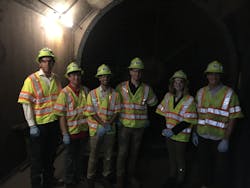BART Teams up with UC Merced Engineering Students Through Innovate to Grow Program
The Capstone Design class for engineering students at the University of California, Merced gives students a chance to work on real-world problem-solving with businesses and agencies like Bay Area Rapid Transit.
This spring semester, two student teams will be working on projects with BART mentors, as part of the class taught by Assistant Professor Alejandro Gutierrez.
One team will work on improving maintenance methods for the escalators at San Francisco BART stations. They’ll problem-solve ways to automatically measure and record the escalators' step chain elongation, with the hope that this data will help BART engineers improve the predictive maintenance schedule. The second team will work on improving air flow (HVAC) within a train control room.
“The advancement of technology (many more computers, which produce much more heat) has pushed the HVAC system to its limits. My students are working on a solution to improve the cooling situation,” Dr. Gutierrez said.
Three teams worked on BART projects last fall. One of those teams won third place in UC Merced’s Innovation Design Clinic capstone competition for work on sensors for ventilation systems, an important safety issue.
Gutierrez teaches the Capstone Project class, one part of UC Merced’s Innovate to Grow program, and said his students benefitted greatly from the BART collaboration.
"They had no idea of the type of complex work going on behind the scenes at BART," he said. "They really appreciated the hands-on types of training. They had the opportunity to see things up close and discuss all sorts of minute details with engineers in the field, and that's not something we can give them in the classroom."
Gutierrez said the demographics of UC Merced, with a large percentage of first-generation college students and students of color, make the BART mentorship very attractive.
"One of the characteristics of our students is that they are extremely community-oriented. Many are children of immigrants, and they have not had a lot of contact with large companies, and they are committed to public service. Working on a BART project, in a very tangible way, lets them give back. They tell their families about it and they are proud to be doing that work."
Creating bonds with future engineers is high on the radar for BART, where a large percentage of employees are at or approaching retirement age.
“BART engineering is looking towards the future and building partnerships with universities that support diversity within their programs and provide a strong foundation for the future engineers to be successful,” said BART’s Amelia Smithson, Program Manager for Capital programs.
Homza Al-Ariemy, who is from Berkeley, participated in the ventilation system project last fall semester. It involved students coming to BART to do site visits and field work, as well as a BART engineering mentor visiting the school and working with them remotely.
“It was a really good experience,” Al-Ariemy said. “That’s the amazing thing about UC Merced. They allow you to get real-world experience working with a client. It helped me to prepare myself for the future and to determine what I want to do in engineering.”
Mark Matsumoto, dean of the School of Engineering, praised the collaboration involved.
“We are extremely pleased with the engagement and support of BART in the School of Engineering Innovation and Design Clinic (IDC), our senior capstone design program and also providing internship opportunities for our students,” Matsumoto said. (Above, image of some of the fall capstone project students, with their BART mentor, Patrick Quinn, far right)
“As many of our students come from the Bay Area, they have great familiarity with BART. The opportunity to gain valuable practical experience and work with an agency that is part of ‘home’ to these students is wonderful,” Matsumoto said. “These BART opportunities have positioned our students well to be highly productive as future engineers.”
Professor Gutierrez said that wherever these students land, they will make a mark because of the strong work ethic and other values that led so many of them to attend university despite many disadvantages.
“For many of these students, just getting to go to a university is completely out of the sphere of their experience,” he said. “They’re living in a totally different world from what they grew up in. They have to be quick learners, adaptable to new situations, and be able to figure out solutions to problems.”
As an example, he noted that some come from large families who have only one vehicle, in an area with limited public transportation, that they must use for all the family needs: getting to jobs, schools, doctors’ appointments, day care, shopping and everything else. They work out elaborate sharing plans and learn the importance of time management, he said.
“We see in them an amazing resourcefulness,” he said, which is a hallmark of a good engineer.
Mentor Patrick Quinn of BART electrical and mechanical engineering praised the students' work.
"Working with the UC Merced students was a refreshing and rewarding experience for me," he said. "All three teams accepted the engineering challenges with enthusiasm and took complete ownership of their designs."
